Lawn Weed ID and Control Tips
How to identify and manage broadleaf plantain Plantago major (also called “common plantain”). Weed photos are included to help with weed ID.
Plantain is a very common lawn weed — almost as common as dandelions — and is found throughout the United States.
Characteristics
- Cool-season simple perennial – meaning it has a short taproot and does not spread by creeping roots or shoots like the creeping perennials.
- Leaves form a rosette
- Finger-like flower stalks
- Reproduces by seed
- Short, fat taproot
Adapted to many sites, it grows very well on thin lawns that need to be fertilized and is a sign of soil compaction. Adapted to many sites, you can find it in lawns, along roadsides or in pastures.
Edible and used as a medicinal herb. If you enjoy growing edible plants in your landscape, common plantain can be added to your list of edible weeds. High in vitamin B1 and riboflavin, the leaves can be added to salads or cooked as an herb but it has a bitter taste.
Plantain is a native of Europe and Asia. Native Americans called the plant “white man’s footprint” or “Englishman’s foot” because it appeared wherever white men went (Wikipedia).
View more pictures of Broadleaf Plantain and other weeds.
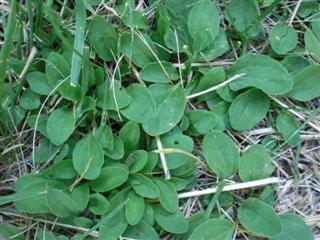
Plantain Lawn Weed Control

Chemical-Free Control
Plantain is easily controlled by hand weeding, use a dandelion weed puller to remove them from lawns or pluck them out of landscape beds with a digging fork. Prevent re-seeding by removing seed heads as soon as you see them. Let weeds dry in the sun for a few days before adding them to your compost pile.
Control with Herbicides

A spring application of crabgrass preventer (pre-emergence) can be used to prevent weed seeds from germinating. Use a preemergence if broadleaf plantain was a problem the previous year. Post-emergent herbicides work best on plantain in mid to late spring and in the fall when the weeds are actively growing.
Weed Images
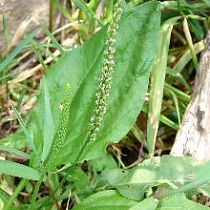
Plantago major
Image courtesy of Sheri Hagwood @ USDA-NRCS PLANTS Database
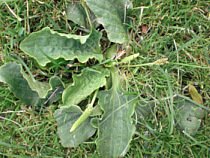
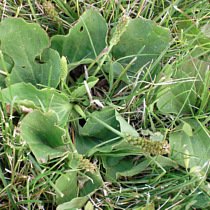
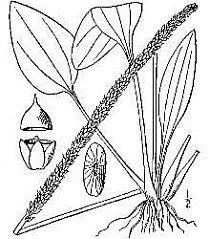
Common Plantain Plantago major Illustration courtesy of USDA-NRCS PLANTS Database / Britton, N.L., and A. Brown. 1913.
Weed Identification
The leaves are very broad and oval-shaped with long petioles that look like miniature celery. They form a rosette that is compact when mowed.
The tiny white flowers are borne on long finger-like spikes. It produces flowers from May to September.
It has a short, fat taproot that produces several fibrous roots.
You might like these
Corn Speedwell | Veronica Arvensis | Lawn Weed Identification
Corn Speedwell (Veronica arvensis) is a low-growing winter annual and a common weed problem in thin turf stands and newly seeded lawns. Pictures to help with lawn weed identification and control.
Mouse-Ear Chickweed | Lawn Weed ID & Control
Mouse-ear chickweed is a common lawn weed found throughout the United States. Its characteristics make it a competitive weed in lawns.
Common Chickweed | Lawn Weed Identification and Control
How to identify and manage Common Chickweed (Stellaria media), a winter annual lawn weed. Photos are included to help with weed id and control. Lawn care tips and advice.
